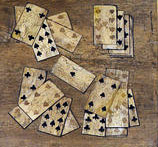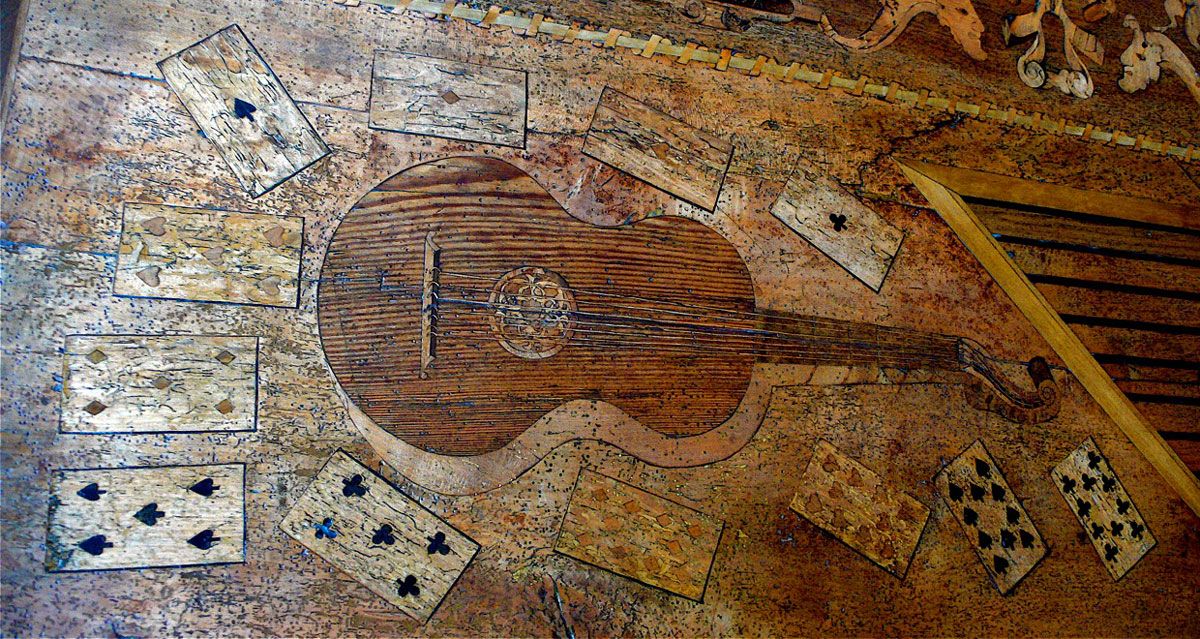Eglantine Table
The Eglantine Table, Hardwick Hall, Derbyshire, elaborately inlaid with marquetry depicting musical instruments, playing-cards, games and heraldic references.
Eglantine Table, Hardwick Hall, Derbyshire, 1567

The Eglantine or “Aeglantyne” table is located in the High Great Chamber at Hardwick Hall, Derbyshire. The oak table is elaborately inlaid with walnut marquetry depicting Elizabethan musical instruments, games and heraldic references, including playing cards, allegorical figures and wooden sheet music by the famous Renaissance composer, Thomas Tallis. The songs are, of course, uplifting rather than bawdy. In one corner is this ‘guitar’ surrounded by twelve playing cards: four aces, fives and tens in each suit.
The question is: Why are only the four aces, fives and tens shown in each suit? Perhaps there is an occult meaning. We had thought about musical intervals. 5:10 = 1:2 which is an octave. But 1:5 has no musical meaning that we know. Do you know anybody who might have an idea what they mean?

Above: detail from the Eglantine Table (Aeglantyne Table), Hardwick Hall, Doe Lea, Chesterfield - The High Great Chamber. The table was made to celebrate the triple marriage contract between the families of Talbot and Cavendish in 1567. Photo credit: Christopher Page.
• See also: National Trust website.

By Simon Wintle
Member since February 01, 1996
I am the founder of The World of Playing Cards (est. 1996), a website dedicated to the history, artistry and cultural significance of playing cards and tarot. Over the years I have researched various areas of the subject, acquired and traded collections and contributed as a committee member of the IPCS and graphics editor of The Playing-Card journal. Having lived in Chile, England, Wales, and now Spain, these experiences have shaped my work and passion for playing cards. Amongst my achievements is producing a limited-edition replica of a 17th-century English pack using woodblocks and stencils—a labour of love. Today, the World of Playing Cards is a global collaborative project, with my son Adam serving as the technical driving force behind its development. His innovative efforts have helped shape the site into the thriving hub it is today. You are warmly invited to become a contributor and share your enthusiasm.
Related Articles

Batman® playing cards
Batman playing cards published by InterCol of London 1989.

Can You Believe Your Eyes?
“Can You Believe Your Eyes?” playing cards featuring visual illusions & other oddities.

Pastime Playing Cards for the Blind
The “Pastime” Playing Cards for the Blind manufactured by Goodall & Son Limd., c.1910.

Songs with Flute accompaniment
Eighteenth century English engraved cards with music for voice and flute.

Love Tests
Vintage novelty “Love Test” cards of a slightly saucy nature but all in good fun!

Ben 10 playing cards
Characters from the American animated television science fantasy series Ben 10.

Doctor Who Trump Card Game
Game for two players in which Doctor Who and the Legendary Legion join battle with the Alien Hordes....

Disney’s Aladdin playing cards
Characters from the 1992 Disney film Aladdin.

2011 Worshipful Company Pack
Celebrating the bicentenary of the birth of Charles Dickens, with characters adapted from drawings b...

Oracle Rock
Cartomantic set depicting rock and pop stars, designed by La Rata, with a book by Virginie Despentes...

Jockey Club de Buenos Aires
Spanish-suited pack by Chas Goodall & Son Ltd for the Jockey Club, Buenos Aires.

New interest in old games
Games once fashionable are now eclipsed by quicker gratifications.

Polygo™
Cards of irregular, four-sided shape for playing word and colour games as well as more traditional o...

Treasures from the Bodleian Library
Rare books, manuscripts, music scores, portraits, maps, gospels, chronicles and other valuable artef...

Victorian grocer’s scale plate
Large flat plate decorated with highly coloured English cards and royal arms.

Queen of Arts
A wide variety of women artists celebrated on cards with illustrations by Laura Callaghan.
Most Popular
Our top articles from the past 28 days

